The ongoing feud between Tesla CEO Elon Musk and Meta CEO Mark Zuckerberg has escalated to a new level with the launch of Meta's Twitter-clone app, Threads.
Musk has publicly criticized Threads, claiming Meta has lured ex-Twitter staff to develop the app—leading to a lawsuit against the company. Critics and subsequent public dialogue regard Musk's Twitter commentary on Zuckerberg and the launch of Threads somewhat irregular, including blunt and often derogatory language and sexually explicit references, the overall tone sharply deviating from what is expected in business discourse.
Zuck is a cuck
— Elon Musk (@elonmusk) July 9, 2023
In contrast, Zuckerberg has expressed his views more subtly. The Meta CEO has taken to tweeting memes and humorously parodying Musk's tweets. This understated yet public mockery further fuels their rivalry—it's a clash of titans in the tech world, their feud simultaneously personal and professional. Despite—or maybe as a result of—the musketeer ambiance, the newly launched Threads app has gained impressive momentum. According to data from Quiver Quantitative, Threads accumulated over 98 million users in less than a week since its launch.
However, such statistics don't overstage Musk's Twitter platform's popularity, as it currently boasts around 368 million users worldwide. The implicit rivalry between Musk and Zuckerberg diverges from a simple clash of personalities. It mirrors the competition between companies representing two significant spheres in the tech industry: social media and electric cars.
This feud appears to be a manifestation of these giants battling for dominance over the tech industry. However, it remains unclear whether the rivalry is a mere playful banter or the sign of a serious competitive climate escalating in the tech world. Adding additional fuel to the fire, both Musk and Zuckerberg have publicly expressed their willingness to participate in a mixed martial arts (MMA) match. This unusual way of dealing with a business disagreement has drawn attention from UFC President Dana White.
White claims to have communicated with both Musk and Zuckerberg, suggesting that such a novel event could possibly rake in over a billion dollars in revenue. The prospect of a physical confrontation seems unlikely and somewhat humorous, yet it depicts the escalating tension between two of the most influential figures in modern technology. Their rivalry transcends their respective industries and seeps through social media platforms, courts, and now, even the possible MMA ring. While the Musk-Zuckerberg feud offers intrigue and a considerable amount of entertainment, the implications cannot be ignored. The manner in which the competition unfolds may shift the power dynamics within the global tech landscape. Meta's Threads has demonstrated significant growth potential, but only time will tell if it can dethrone Musk's juggernaut Twitter platform.
Moreover, the public response around their proposed MMA match is a testament to the influence and reach of these two tech titans. With a potential to generate upwards of a billion dollars in revenue, the pull they hold over public interest is not just confined to their innovations but now extends to their personal feuds and potential physical confrontations. The Musk-Zuckerberg rivalry raises questions about the nature of competition in the tech industry at large—it's more than just business. It is an exhibition of how personal feuds can permeate professional domains, set new norms, and potentially even change the way industry players engage.
The world is watching as this real-life tech drama unfolds.

